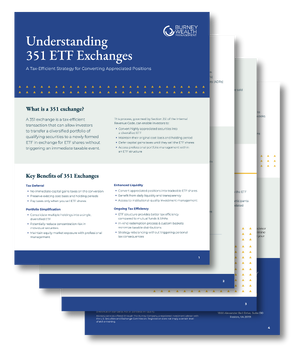Tax-Free Portfolio Conversion with 351 Exchanges
Transform your taxable investments into a tax-efficient ETF structure without triggering capital gains taxes.
What is a 351 Exchange?
A 351 exchange is a tax provision that can allow investors to convert separately managed accounts into ETF shares completely tax-free during an ETF's launch period.
Key Benefits of a 351 Exchange
- Reduced Tax Impact: Expectations of minimal to no capital gains distributions*
- Cost Basis Preservation: Maintain your existing cost basis and tax lots
- Enhanced Tax Planning: Greater control over your tax situation
*Capital gains distributions are possible inside an ETF if the ETF is not able to use the create-redeem or custom basket process.
The Benefits After Conversion
- Expectations of $0 capital gains distributions*
- Allows for more aggressive implementation of an investment strategy
- Access to Burney's proven investment expertise
- Long-term tax control and planning advantages
*Capital gains distributions are possible inside an ETF if the ETF is not able to use the create-redeem or custom basket process for whatever reason.
A simple, streamlined conversion process
You sign a Letter of Authorization allowing your custodian to send your holdings to the ETF's custodian, who converts them into ETF shares and returns them to your account.
Frequently Asked Questions
Who is eligible for a 351 exchange?
What investments can be converted?
Generally, US equities can be converted. ETFs can often be converted as well, but mutual funds, bonds, international stocks, and alternative investments usually cannot.
What happens to my cost basis?
Your existing cost basis transfers to the ETF, preserving your tax lots and allowing for future tax planning.
How does this benefit me long-term?
After conversion, your investments can be rebalanced without triggering taxable events, potentially saving thousands in taxes annually while maintaining exposure to our investment strategy.
Will I still pay taxes on dividends?
Important Disclosures
This material is for educational purposes only and does not constitute financial, investment, tax, or legal advice. Please consult with appropriate tax and financial professionals before making any investment decisions.
No guarantee of availability: 351 exchange opportunities are limited and occur only during specific ETF launch periods. There is no guarantee that future opportunities will be available.
Tax considerations: While 351 exchanges can defer capital gains taxes, they do not eliminate them. Tax consequences will occur when ETF shares are sold. State tax implications may vary.
Investment risks: All investments carry risk, including potential loss of principal. Past performance does not guarantee future results.
Diversification requirements: Participation in 351 exchanges requires meeting specific diversification standards. Not all portfolios will qualify.
Advisory services offered through The Burney Company, a registered investment adviser with the U.S. Securities and Exchange Commission. Registration does not imply a certain level of skill or training.
Read the latest commentary from our investment blog.
Nashville
4235 Hillsboro Pike
#300
Nashville, TN 37215
Advisory services are offered through the Burney Company, an investment advisor registered with the U.S. Securities & Exchange Commission. SEC registration does not constitute an endorsement of the firm by the Commission nor does it indicate that the advisor has attained a particular level of skill or ability.
© 2026 Burney Wealth Management | Privacy Statement | Terms & Conditions | Disclaimers | ADV | Form CRS (ADV Part 3)

